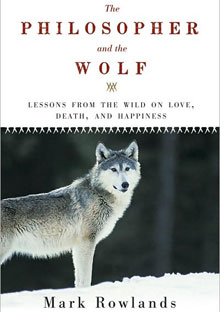
The title of this post, "how to cook a wolf," comes from MFK Fisher's collection of essays by the same name. Obviously, neither she nor I mean this phrase literally. Rather, "the wolf" is a metaphor for hunger, fear, loneliness, or any similar emotion that threatens to engulf you, much the way a literal wolf actually can.
MFK believed that one could "cook" away these emotions, your wolf, as it were. In her particular case, this was a good move, as the essays from this period were all written during World War II–a time of food rations and much hunger, loneliness, and fear.
On a day with a history like today, such emotions are equally appropriate, and I believe, like MFK did, that food can provide at least a modicum of comfort to those facing down some wolves of their own. For me, food is a strange amalgam of comfort, love and family. As an old Russian proverb goes, "And as I say 'I love you,' so too I say, 'come eat.'"
And more to the point of wolves, one of my favorite books that I have had the privilege to publish is a memoir entitled The Philosopher and the Wolf by Mark Rowlands. In this instance, the wolf, Brenin, is Mark's companion, and embodies what is noblest becomes a sort of metaphysical ideal that Mark strives to engage with, both as a man and as a philosopher (he is currently a philosophy professor at the University of Miami).
 To wit, Mark and Brenin find themselves living in the south of France midway through the narrative. The two have settled into the peculiar routine of walking to town each morning and getting two plain croissants at the little village patisserie –one for Mark, one for Brenin. Luckily, the pastry chef is not the least disturbed by the incongruous pair.
To wit, Mark and Brenin find themselves living in the south of France midway through the narrative. The two have settled into the peculiar routine of walking to town each morning and getting two plain croissants at the little village patisserie –one for Mark, one for Brenin. Luckily, the pastry chef is not the least disturbed by the incongruous pair.After about a month of daily croissants, Mark realizes that Brenin is as grateful and joyful to eat his croissant each morning as he was the day before. He is as happy as teh day he tasted that first croissant.
Granted, these are incredible croissants–large and airy, yet packed with a rich, buttery taste that melts in the mouth. Yet Mark cannot help but think that most people would grow weary of these croissants, no matter how lovely and delicious they are. Brenin, however, never thinks, "Oh jeeze, another croissant? When is this guy going to take me to get a bagel? Or a muffin? Or even a scone?" The joy of today's croissant is not diminished by the anticipation of future croissants, nor is it sullied by the fact that maybe that croissant from three days ago was a bit larger. Nope. For Brenin, each croissant is its own little miracle and reward in and of itself. It doesn't need butter or jam, and the fact that he had one yesterday, and will most likely get one tomorrow, God willing, is immaterial. The croissant is good, just as it is.
And, indeed, so are most things. So to everyone out there, I hope you too enjoy and savor your croissant.



No comments:
Post a Comment